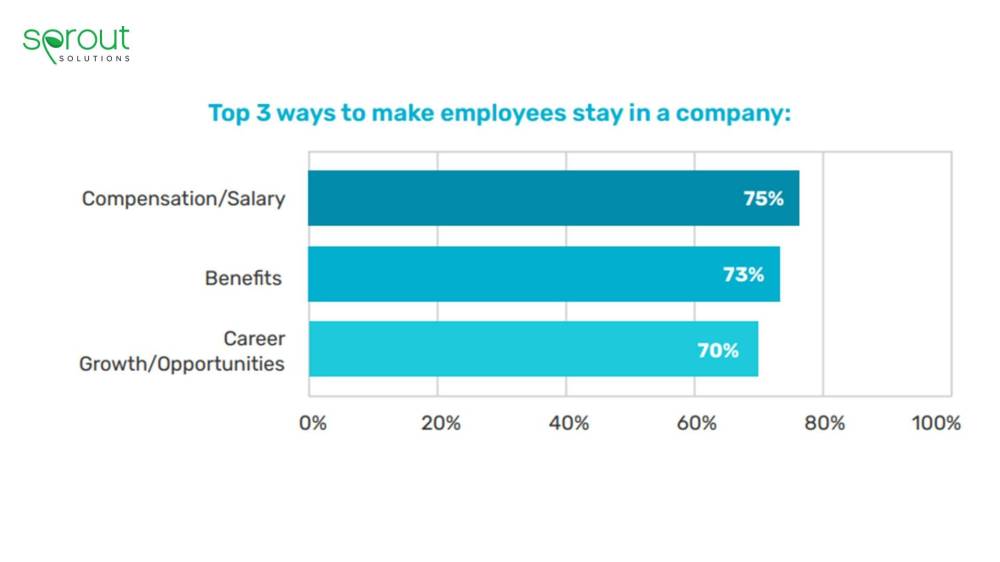As the “Great Resignation” trend is still in full swing, companies have three ways to make their employees stay with salary topping the list, a study by Filipino HR solutions company said.
The 2022 State of the HR Report by Sprout Solutions, which seeks to determine the Challenges and Imperatives for HR Business Leaders in Today’s New World of Work, identified three ways to make employees stay in a company: salary, benefits, and career/growth opportunities.
The study, which surveyed 200 HR professionals in the Philippines, showed that 75 percent of employees chose to stay with a company because of the compensation or salary; 73 percent due to benefits; and 70 percent career growth/opportunities.
Employees want a company that offers a reasonable compensation and benefits package, study noted.
An attractive benefits package also improves employee retention: 97.66 percent agree that employee benefits have a direct impact on employee retention; 84.58 percent agree that employee benefits reduce attrition, and 74 percent completely agree that offering benefits make employees happier.
Companies must also address employee engagement, recruitment, and learning and development.
According to the study, meaningful engagement affects employee well-being in a good way, with 95.79 percent of HR professionals sharing that employees care about employee engagement activities and 98 percent saying that engagement helps with overall well-being.
However, the study noted that 63 percent of HR professionals craft employee engagement activities by themselves without asking for employee input.
In terms of working environment, 65 percent of HR professionals said that 65 percent of employees prefer hybrid work.
Based on the study, the hybrid model also changed various HR processes in different ways. Some of these changes were positive, such as more options for reliable HR systems. Additionally, organizations already using digital HR systems have streamlined timekeeping, computing compensation, and other challenging processes.
With the hybrid work era creating new opportunities and easier ways to find greener pastures, HR leaders should brace themselves for more turnover waves, the study added.
To help HR professionals adapt to a hybrid workplace, companies need to make the digital shift. The Sprout study found that automated HR systems and improved benefits will have the biggest impact on current work setups.
The top three preferred HR improvements are Automated HR Systems (47%), Mental and Physical Health Resources (44%), and Company-wide allowances such as Transportation, Electricity, and Internet (42%). Many HR functions have migrated to automated systems. In 2022, only 22 percent of the respondents process payroll manually, and 60 percent process payroll through human resources information system.
The report noted that digital recruitment has become the norm. HR teams used to rely on traditional recruitment strategies like partnering with third-party agencies, posting on job boards, and joining job fairs. But because of other digital recruitment tools, talent acquisition has become more streamlined and targeted: Aside from finding applicants online, 35 percent of respondents also process recruitment through an Applicant Tracking System.
Survey respondents also believe that Learning and Development (L&D) Programs have a positive impact on employee retention: 87 percent of HR leaders believe that L&D programs play a key role in attracting and retaining employees; 91 percent claimed that L&D programs somewhat or to a great extent improve overall company performance. Businesses that provide employees with self-growth and upskilling/reskilling opportunities experience lower attrition and faster recruitment cycles.
Patrick Gentry, CEO and Co-Founder of Sprout said “Innovation and technology are no longer just novelty advantages to improve the employee experience. 2022 is shaping up to be the year hybrid work becomes the rule rather than the exception, and tech has a huge role to play. If there’s anything to take away from this paper, it’s that there’s a mutual understanding between what HR professionals need and the benefits HR tech adoption can bring.”
He adds that adopting a hybrid work model powered by technology is the key to staying relevant in the competitive business landscape. “HR tech should not only be seen as a tool to reduce administrative burden. Instead, HR leaders and professionals should leverage HR tech to create cohesive and connected hybrid working communities and build a culture that inspires productivity and collaboration.”
The hybrid workplace needs to be equipped with the best HR software that can help businesses stay compliant and efficient.For any query with respect to this article or any other content requirement, please contact Editor at [email protected] Bulletin

